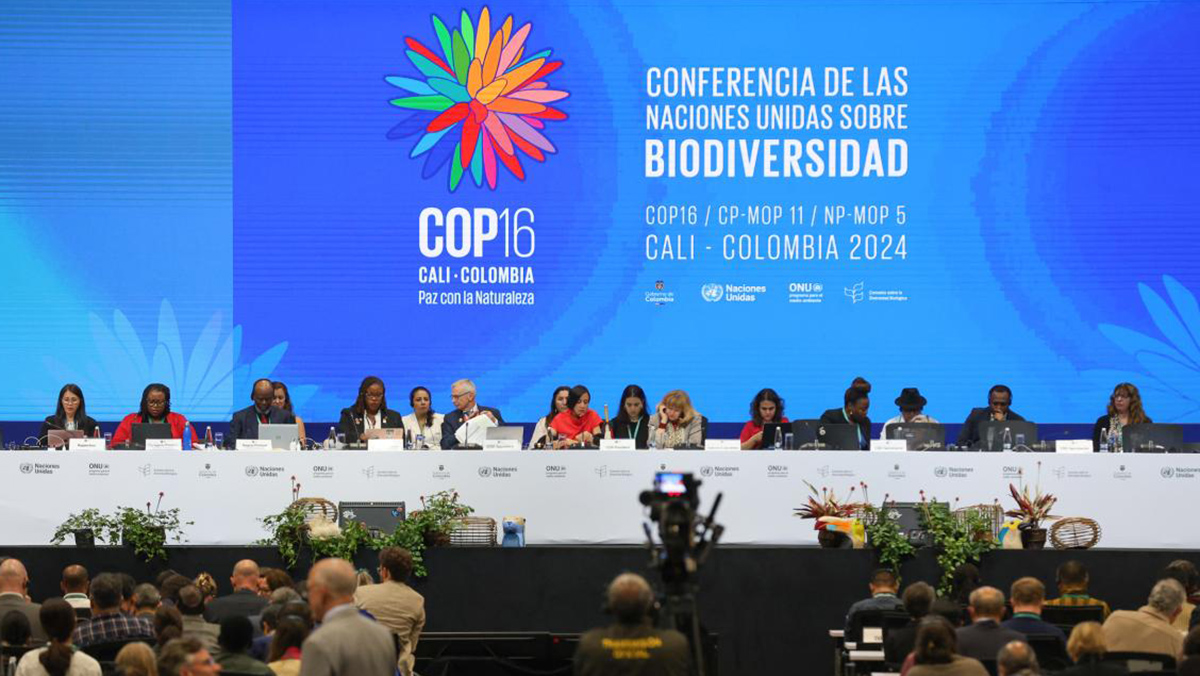© International Institute for Sustainable Development (IISD)
Building on progress made at UN Biodiversity Conference (COP16)
Today, more than 4.3 billion people — over half the world’s population — depend on biodiversity for their livelihoods. Moreover, 80 per cent of the world’s poor and vulnerable, most of whom live in rural areas, directly rely on biodiversity for survival. However, up to 40 per cent of the world’s land is degraded, and biodiversity loss is accelerating, with projections showing this decline will continue through 2050.
The 16th Conference of the Parties to the Convention on Biological Diversity (CBD COP16), held in Cali, Colombia, from 21 October to 1 November 2024, marked a pivotal moment in global efforts to address biodiversity loss. The conference centred on advancing the implementation of the Kunming-Montreal Global Biodiversity Framework (KMGBF), a comprehensive plan to halt biodiversity loss and protect ecosystems including conserving 30% of land and oceans by 2030.
COP16 focused on how to mobilize resources to support biodiversity conservation for developing countries, foster capacity building, technology transfer, support Indigenous Peoples and Local Communities, and address challenges like climate change, ecosystem restoration, and marine biodiversity protection.
While international trade has often been associated with environmental degradation, it also offers immense potential for conservation. With 55 per cent of global GDP — around USD$58 trillion — directly dependent on nature, trade policies must align with the Kunming-Montreal Global Biodiversity Framework to halt biodiversity loss, restore ecosystems, and support sustainable development.
One of the highlights of the conference was the inaugural "Trade Day" co-organized by UN Trade and Development (UNCTAD), the World Trade Organization (WTO) and the Convention of Biological Diversity (CBD) Secretariats and United Nations Environment Programme (UNEP), in collaboration with other partners on 26 October 2024. This thematic event spotlighted the transformative role sustainable trade can play in biodiversity conservation. It facilitated and advanced discussions among negotiators and stakeholders on best practices and solutions for trade and trade-related policies to address biodiversity loss and implement the goals and targets of the KMGBF to foster inclusive social development, its impact on terrestrial and aquatic ecosystems, including its ability to drive innovation and specialized markets.
For over 25 years
One of the global programmes implemented by UNCTAD under the BioTrade Initiative has been the Global BioTrade Facilitation Programme: Linking trade, biodiversity and sustainable development supported by the Swiss State Secretariat for Economic Affairs SECO. This six-year programme, which will come to an end, has provided countries with the tools to balance economic growth with biodiversity conservation. Between 2003 and 2023, BioTrade sales surged from $40 million to nearly $40 billion, a testament to the growing market for sustainable products.
Objective
Co-hosted by the UN Trade and Development (UNCTAD) and the Geneva Environment Network (GEN), this event builds on the outcomes of the CBD COP16 and offers a platform to explore opportunities for further collaboration in fostering sustainable trade within the KMGBF.
The Briefing will focus on “Achieving Biodiversity Goals Through Trade,” providing updates on the key outcomes of COP16 and exploring how trade can support the Kunming-Montreal Global Biodiversity Framework (KMGBF). It will also highlight opportunities for collaboration to promote sustainable trade, biodiversity conservation, and equitable development.
This event is part of a series of activities organised by UNCTAD and partners towards the closure of the Global BioTrade Facilitation Programme: Linking trade, biodiversity and sustainable development launched in 2018 with the support of the Swiss Secretariat for Economic Affairs SECO.
Target audience
- All Member States and members of International Organizations
- CBD COP16 Delegates
- Government agencies/policy makers working in the areas of trade, environment, biodiversity, and development.
- Experts and practitioners in the areas of trade, environment, biodiversity and development
- United Nations agencies, NGOs, development agencies and other international organization working on biodiversity, sustainable development, climate change, and trade projects.
- BioTrade and biodiversity-based companies, entrepreneurs and start-ups.
- Cooperatives, social enterprises and associations
- Business associations, chambers of commerce and trade associations
- Indigenous peoples’ associations, cooperatives and local communities and relevant constituencies
- Academia
Participation
The briefing is open to all member States of UNCTAD, specialized agencies and intergovernmental bodies and non-governmental organizations. For those that are not able to attend in person, the meeting will be broadcasted via live streaming.
Registration
Registration should be completed online.

